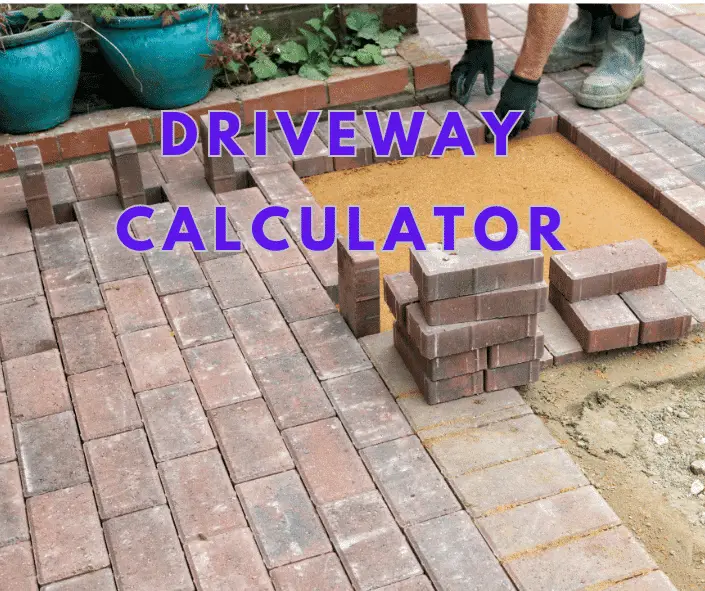Easy-to-Use Driveway Materials Calculator – Estimate Your Paving Project Materials in Minutes!
Are you planning to build or renovate your driveway?
Figuring out the right amount of materials needed can be a daunting task. But worry no more – we’ve created a user-friendly Driveway Calculator to make your life easier!
Our Driveway Materials Calculator takes the guesswork out of determining the number of pavers and the amount of sand and type 1 MOT needed for your paving project. Simply input the dimensions of your driveway, pavers, and other relevant information, and our calculator will provide you with accurate estimates in no time.
Here’s how to use the Driveway Materials Calculator
- Access the calculator below
- Enter the required information:
- Width and length of your driveway (in meters)
- Width and length of your pavers (in millimeters)
- Depth of zone 2 sand (in millimeters) from the dropdown menu
- Depth of type 1 MOT (in millimeters) from the dropdown menu
- Joint size (in millimeters)
- Click the “Calculate” button, and the calculator will display the results, including:
- Area to be covered (in square meters)
- Number of pavers needed
- Amount of zone 2 sand needed (in metric tonnes)
- Amount of type 1 MOT needed (in metric tonnes)
Our Driveway Materials Calculator will not only save you time but also help you avoid wasting materials or falling short during your project. With this handy tool, planning your driveway construction has never been easier.
Give our Driveway Calculator a try today and make your paving project a breeze! Happy paving! 🏡🚗
Driveway Materials Calculator
Additional Tips and Tricks for a Successful Driveway Paving Project
Our Driveway Calculator is designed to make your paving project easier, but we want to provide you with even more information to ensure a successful outcome.
Here are some useful tips and tricks to consider when planning and executing your driveway construction or renovation:
- Choose the right pavers: Select pavers that complement your home’s architecture and landscape. Consider factors like color, shape, and texture. Also, ensure that the pavers are durable and suitable for your region’s climate.
- Proper preparation: A well-prepared base is essential for a long-lasting and stable driveway. Excavate the area to the required depth, and install a geotextile fabric to prevent the subgrade soil from mixing with the base materials. Compact the subgrade soil and the base materials (type 1 MOT) properly to create a solid foundation for the pavers.
- Drainage considerations: Proper drainage is crucial for the longevity of your driveway. Plan the driveway slope to direct water away from your home or garage and towards the street or a designated drainage area. Incorporate permeable pavers or a drainage system if necessary.
- Edge restraints: Install edge restraints along the perimeter of your driveway to prevent lateral movement of the pavers and the base materials. Use sturdy materials such as concrete or plastic edging designed specifically for paver installations.
- Sand bedding: Use a consistent depth of zone 2 sand for the bedding layer, and screed it to ensure a smooth and level surface for the pavers. Avoid using limestone or other materials that could negatively impact the stability of the pavers.
- Proper installation: Lay the pavers in your desired pattern, leaving enough space for joint material. Use a rubber mallet to set the pavers in place, and check the alignment frequently to ensure a uniform appearance.
- Joint material: Use the appropriate joint material, such as polymeric sand, to fill the gaps between the pavers. This helps stabilize the pavers and prevents weed growth and insect infestation.
- Sealing: After the installation is complete, consider sealing your pavers to protect them from stains, enhance their color, and prolong their lifespan.
- Maintenance: Regularly clean your pavers with a broom or garden hose to remove dirt and debris. Address any stains or spills immediately to prevent permanent damage.
.
Essential Tools and Supplies for Your DIY Driveway Project
A successful DIY driveway project requires not only the right materials but also the appropriate tools and supplies.
Here’s a list of essential items to help you complete your driveway construction or renovation efficiently and safely:
- Measuring tape and marking tools: Accurate measurements are crucial for any construction project. A measuring tape, stakes, and marking paint or string will help you outline the area and ensure proper dimensions.
- Excavation tools: Depending on the size of your project, you may need a shovel, pickaxe, or even a small excavator to remove soil and create a level surface for your driveway.
- Compactor or tamper: A plate compactor or hand tamper is essential for compacting the subgrade soil and base materials to create a solid foundation for your pavers.
- Wheelbarrow: A wheelbarrow will come in handy for transporting sand, gravel, pavers, and other materials around your worksite.
- Geotextile fabric: Installing a geotextile fabric between the subgrade soil and the base materials can prevent unwanted mixing and increase the longevity of your driveway.
- Sand screed: A sand screed, which can be a simple wooden board or a specialized tool, is used to create a smooth and level surface for the pavers.
- Masonry saw or splitter: Cutting pavers may be necessary for fitting them around curves or edges. A masonry saw or splitter can help you achieve clean and precise cuts.
- Rubber mallet: Use a rubber mallet to set the pavers in place without damaging their surface.
- Carpenter’s level or laser level: A level is essential for maintaining a consistent slope and ensuring proper drainage for your driveway.
- Broom and blower: A broom and blower will help you keep your worksite clean and free of debris during the installation process.
- Knee pads and gloves: Personal protective equipment, such as knee pads and gloves, will keep you comfortable and safe while working on your driveway project.
- Paver spacers: These small plastic tools ensure consistent spacing between pavers and help maintain a uniform appearance.
- Polymeric sand or joint material: Choose a high-quality joint material to fill the gaps between the pavers and stabilize the surface.
- Sealer and applicator: Applying a sealer can protect your pavers from stains and weather-related damage. Use a roller, brush, or sprayer for even application.
By gathering the necessary tools and supplies before starting your DIY driveway project, you’ll be better prepared to handle any challenges that may arise and ensure a smooth and successful installation process.
Armed with our Driveway Materials Calculator and these handy tips, you’re well on your way to creating a beautiful and long-lasting driveway that will enhance the curb appeal of your home for years to come.
Happy paving!
Best Grass for Clay Soil | Choosing the Right Grass Seed for Your Lawn
How to Landscape a Sloped Backyard on a Budget
Author Profile

- I have many qualifications and certificates in construction, such as City & Guilds, CPCS and CITB. These are the highest standards of training and competence in the industry. Whether you need help with plumbing, carpentry, bricklaying or any other trade, I’m here to help you succeed.
Latest entries
- March 6, 2024CalculatorsWall Tile Calculator: How Many Wall Tiles Do You Need
- February 29, 2024Roof Truss Cost Calculator
- December 31, 2023Wage Take Home Calculator
- December 30, 2023Day Rate Calculator


Comments are closed.